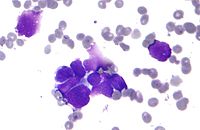
Photo from wikipedia
ObjectiveThe aim of this retrospective observational study was to analyze the clinical and pathological characteristics of small-cell neuroendocrine carcinoma of the gynecologic tract (SCNCGT).MethodsTwenty patients with SCNCGT were enrolled and… Click to show full abstract
ObjectiveThe aim of this retrospective observational study was to analyze the clinical and pathological characteristics of small-cell neuroendocrine carcinoma of the gynecologic tract (SCNCGT).MethodsTwenty patients with SCNCGT were enrolled and their clinic-pathological features were analyzed. All patients were treated at the Beijing Obstetrics and Gynecology Hospital, Capital Medical University, China, and were followed up until December 31, 2017.Results(1) Patient characteristics: The incidence of SCNCGT was 0.3% (20/6578) of gynecologic cancer in our hospital from January 1, 2007, to December 31, 2017. The average age of the patients was 42.0 ± 11.8 (23–63 years). Out of 20 patients enrolled, seven (35.0%) had lymph node metastasis. Out of 17 patients treated with complete surgery, 14 (82.4%) had lymph-vascular space invasion. (2) Treatment: Eleven out of the 14 patients with small-cell neuroendocrine carcinoma of the cervix (SCNCC) were treated with radical surgery; all the 11 patients received chemotherapy and radiotherapy postoperatively. The remaining three patients received comprehensive chemotherapy and/or radiotherapy instead of radical surgery. The six patients who had one or the other type of SCNCGT (involving the ovary, endometrium, or vagina) were all treated with comprehensive surgery. (3) Prognosis: The follow-up time for the study ranged from 8 to 87 months. Three (15.0%) of the 20 patients were diagnosed with distant metastasis at the beginning of the study. Eight (40.0%) patients died as of December 31, 2017, while the other 12 patients were in follow-up. The average survival time was 43.6 months (16–77 months).ConclusionSCNCGT is a highly malignant tumor characterized by rare morbidity, a propensity for metastasis, and poor prognosis. Comprehensive treatment may be a good approach to prolong survival in some patients.
Journal Title: Archives of Gynecology and Obstetrics
Year Published: 2018
Link to full text (if available)
Share on Social Media: Sign Up to like & get
recommendations!